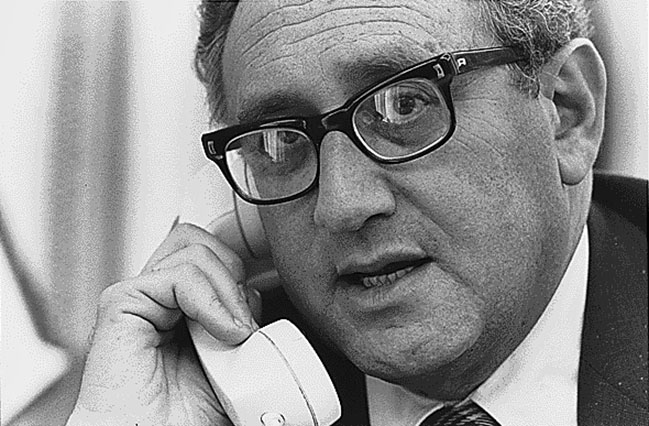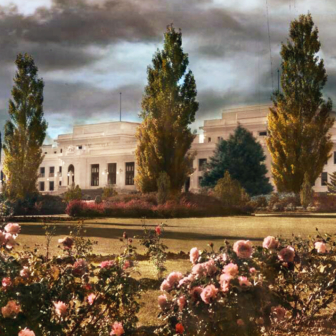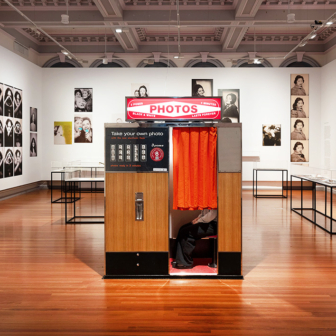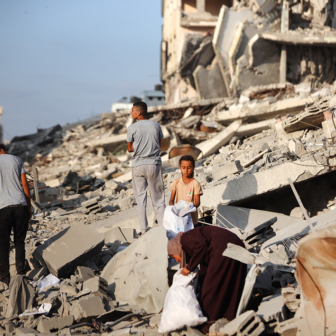Kissinger 1923–1968: The Idealist
By Niall Ferguson | Allen Lane | $79.99
Kissinger. The name speaks of power and provokes passion. Dr K., the foreign affairs Svengali with the Strangelove accent, still matters to the way diplomacy is played and power understood four decades after he left office. In his nineties, his thoughts are reported, his advice sought.
The field of scholars who have also wielded international power is small. The qualities of the one often hinder the needs of the other. In this select category of thinkers and players, Henry Kissinger stands as the most important of our time. Not least because that mix of scholar and strategist contains so many contradictions.
When president Richard Nixon appointed Kissinger as his national security adviser, former president Dwight Eisenhower was bemused. “But Kissinger is a professor,” he said. “You ask professors to study things, but you never put them in charge of anything.” Eisenhower had little experience of the dark and intense struggles of the average university department, yet his point was fair. Kissinger’s formulation of this point is one of his sharper thrusts: “University politics are vicious precisely because the stakes are so small.”
Typical Dr K. A sharp mind allied to an even sharper tongue. The Kissinger bon mots are a glittering element of the persona. Though the most famous is “Power is the ultimate aphrodisiac,” many of his other one-liners are superbly quotable, with a dash of Marx – Groucho, that is.
The illegal we do immediately; the unconstitutional takes a little longer.
There cannot be a crisis next week. My schedule is already full.
I do not stand on protocol. If you just call me Excellency, it will be okay.
The longer I am out of office, the more infallible I appear to myself.
Among the many Kissinger puzzles, as his authorised biographer Niall Ferguson notes, is that the sharpness of his wit was in inverse proportion to his popularity.
This first volume of biography (878 pages of text and nearly one hundred pages of notes) covers Kissinger’s life up to the moment he entered the Nixon White House. While a second volume will focus on his performance in power, this volume essentially charts his development as a thinker. Ten years of work (undertaken at Kissinger’s suggestion) have produced a definitive version of the making of the man, as refugee, soldier and scholar.
Ferguson is a fan, although one who came armed with a legal agreement stating that Kissinger had “no right to vet, edit, amend or prevent publication of the finished manuscript.” Not much to provoke Dr K. has crept into this first volume. More than a picture of a singular man, it does parallel duty as a history of the cold war through American eyes.
Ferguson briskly dismisses any moral equivalence between the West and communism during the confrontation. The mass murderers were in the red corner, he writes, quoting the estimate that “the grand total of victims of Communism was between eighty-five and one hundred million.” This is the equation that underlies Ferguson’s response to Kissinger’s critics:
Arguments that focus on loss of life in strategically marginal countries – and there is no other way of describing Argentina, Bangladesh, Cambodia, Chile, Cyprus and East Timor – must be tested against this question: How, in each case, would an alternative decision have affected US relations with strategically important countries like the Soviet Union, China, and the major Western European powers? For, as Kissinger himself once observed, the statesman is not like a judge, who can treat each individual case on its merits. The maker of grand strategy in the cold war had to consider all cases simultaneously in the context of a prolonged struggle against a hostile and heavily armed rival.
The cold war was the defining event of Kissinger’s careers as scholar and policy-maker. Thinkers mattered in this great struggle because, at root, it pitted the Enlightenment theories of the American constitution against the vision of Marx and Lenin articulated by the Soviet Union.
Ferguson sets it up this way: “The cold war was not about economics. It was not even about nuclear stockpiles, much less tank divisions. It was primarily about ideals.” And it’s in the realm of ideals that Ferguson wants to completely remake our understanding of what drove Kissinger.
Having made his name with a book arguing that the British Empire was a wonderful thing for all those colonised, Ferguson seeks to do something similar with this biography. He aims to upend the war-criminal critique of Kissinger. This view of Kissinger as an amoral Machiavelli, modelling himself on Metternich and Bismarck – “at once hateful and unstoppable” – is simply wrong, he argues. It can only be mounted by ignoring much of what Kissinger wrote.
The critics defined the Kissinger doctrine as “an obsession with order and power at the expense of humanity.” He and Nixon were seen as sharing “a global realpolitik that placed a higher priority on pragmatism than on morality.” No, says Ferguson, this is not what drove Dr K. To mount his case, he describes this first volume as being about Kissinger as “The Idealist,” whose role model as a thinker was not Metternich or Machiavelli but the philosopher Immanuel Kant, the great advocate of perpetual peace through universal democracy.
Kant was at the centre of Kissinger’s first thesis, “The Meaning of History,” a 388-page opus that has gone down as the “longest-ever thesis written by a Harvard senior and the origin of the current limit on length.” Although Ferguson plays down psychological interpretations of his subject’s policy drives and choices, Kant was certainly a towering figure who could be embraced by Kissinger when much else of his German heritage was in ashes.
Kissinger was a devout fifteen-year-old Orthodox Jew when he fled Germany with his family in 1938. By the end of the war he had lost those beliefs, and “for most of his adult life, he characterised himself as Jewish by ethnicity rather than by faith.” For Ferguson, Kissinger’s view of the limits of human understanding was based on “the searing experience of waging war against the Nazis.”
Kant may have offered enlightenment and hope to a young German American whose US Army division had fought in the bitter Battle of the Bulge. Any innate optimism about humanity was severely tested when Kissinger witnessed the liberation of a concentration camp at Ahlem, west of Hanover. One of the rescued survivors of this hell on earth remembered that it was Kissinger who told him, “You are free.”
After victory, Kissinger worked as an intelligence sergeant on de-Nazification. As his comrades headed back to the United States, Kissinger told his parents of his decision to stay on amid the ruins of the Reich: “You’ll never understand it & I would never explain it except in blood and misery and hope.”
Returning home in mid 1947, Kissinger enrolled at Harvard University as one of the two million ex-servicemen able to go to college under the GI Bill. The young man whose destiny had been to work as an accounts clerk in New York was to spend a quarter of a century as a Harvard man.
The PhD thesis on nineteenth-century diplomacy at first looked like a lousy career choice for a would-be academic; there was not much call in those days for musings on the machinations of Lord Castlereagh and Prince Metternich. What lit a rocket under the career was Kissinger’s sideways shift into the new field of strategic studies created by the cold war.
The diabolical issues of nuclear weapons strategy could not be solved by the “scientists, soldiers and statesmen of the Eisenhower administration.” Academics and think-tankers like Kissinger stepped forward because they could speak freely where those closer to the secrets of state could not. They could theorise about how the force of this mighty weapon could be used.
Kissinger’s contribution was a set of ideas about how nuclear war could be made a usable instrument of policy; how the bomb could be used for limited conflict without laying waste to the planet. Nuclear strikes could go hand in hand with diplomatic negotiation and limited objectives, he believed; the United States had to ready itself to fight a limited nuclear war because no president would be willing to order an all-out nuclear conflict. That ultimate hesitation meant the Soviet Union could keep on pushing, step by step, and communism would slowly triumph.
By the standards of the nascent peace movement, Ferguson writes
the argument that being prepared to use nuclear weapons was a moral act was of course bizarre. But that ignored the fundamental premise that not being prepared to use them might make a Soviet victory in the cold war inevitable.
The Kissinger remedy was to maximise the range of military options along a spectrum “between surrender and Armageddon.” One historical example he used was the first world war, which was “fought as a total war over a relatively trivial issue because no other alternative had been considered.”
Kissinger’s book Nuclear Weapons and Foreign Policy was a “cold, calculated argument for the graduated use of nuclear weapons,” writes Ferguson. It could certainly have been called in evidence by later critics who cast Kissinger as a war-loving Strangelove – although the nuclear-crazed Strangelove character in Kubrick’s film was “more Herman Kahn, not Henry Kissinger.”
The professor-adviser was launched on the public stage. He shuttled between Harvard, New York and Washington – that American triangle of brains, money and power. By 1958, John F. Kennedy could quote Kissinger in a Senate speech without needing to explain who he was. In the race for the Republican presidential candidacy in 1960, this newly famous public intellectual committed to a political plutocrat, Nelson Rockefeller, and shunned (and personally despised) Richard Nixon.
As the 1950s turned into the 1960s, Kissinger’s central ideas about the utility of limited nuclear war underwent “a remarkable shift.” The advent of long-range missiles and the rapid growth of the Soviet arsenal led him to doubt the possibility of setting limits and to fear the considerable chance of miscalculation. The volte-face didn’t check his trajectory.
He worked as part-time adviser for the administrations of the two Democrat presidents who made the 1960s, Kennedy and Johnson. He discovered much about the workings of Washington from serving in the Kennedy White House, although he hardly ever met JFK. Kissinger got a lesson “in the dark arts practised inside the Washington Beltway” that would serve him well in the Nixon era. In Ferguson’s words, “access to the president was not the most important thing in American politics; it was the only thing – and without it even the best and brightest of the Harvard whiz kids was doomed to impotence.”
The whiz kid also learnt about being too honest or sharp in talking to the press. As Ferguson wryly notes, “There are few things more deceptively dangerous in politics than a journalist’s question.” Expect Kissinger’s schmoozing of Nixon and playing of the press to be features of volume two.
As America under Johnson turned its attention to Vietnam, so did Kissinger. A series of study tours of Vietnam working for the US ambassador in Saigon gave him a close-up view of the unfolding tragedy. Some of his sardonic judgements capture the flavour. “I am becoming increasingly concerned that in Vietnam it is relatively simpler to figure out what to do than how to do it,” he observed on one occasion. “I never had any doubt that the Vietnamese were capable of organising complicated things,” he commented aphoristically. “What I am not so sure about is whether they can organise simple things.”
Kissinger’s cold-war framework meant that, however uncomfortably, he flew with the hawks. Catch-22 logic prevailed at every turn. The United States would have to fight the war in Vietnam in order to negotiate its way out of Vietnam. Negotiations were necessary because the South Vietnamese government was so weak, but they could not happen precisely because a weak South Vietnam feared being betrayed by the Americans at the bargaining table. “The danger is that if we do offer the Viet Cong our slow retreat, this will perhaps stampede our side into a fast retreat.”
About the same time, Kissinger observed that Vietnam had become “a crucial test of American maturity… We do not have the privilege of deciding to meet only those challenges which most flatter our moral preconceptions.” To walk away from Vietnam would be irresponsible, a betrayal of American ideals. The Harvard professor was still a “bit-part actor in Washington,” but as the nation turned against the war his views were increasingly invoked by a Johnson administration struggling to “square the circle of its unwinnable war.”
Ferguson believes that by 1968 Kissinger’s thinking on Vietnam can be divided into four dimensions:
1. The Johnson administration’s most “elementary blunder” was to have become diplomatically isolated: “Aside from South Korea and distant Australia, almost none of its allies offered it meaningful support in Vietnam… By contrast, Hanoi was in the happy position of being able to play two powerful allies off against one another: the Soviet Union and China.”
2. The United States needed to extricate itself from a position of weakness using cold calculations of self-interest.
3. As with Germany so with Vietnam: no unification of the divided country could be understood separate from the geopolitical context. “In either case, a unification that ended up producing an enlarged Soviet satellite had to be resisted.”
4. The United States needed to achieve flexibility in the system of great power relations. The grand Kissinger strategy would be to revive the US alliance with Western Europe, achieve detente with the Soviet Union by “seeking practical objects for cooperation,” and reach out to the revolutionary pariah, Maoist China. Washington’s chance to shift the balance of power by playing a new China card was an idea thrown up during Kissinger’s unsuccessful foray into secret diplomacy over Vietnam. As an unofficial envoy, Kissinger had his eyes opened to the potential for a US–China deal by talking to Soviet bloc strategic thinkers who emphasised the significance of the deep rift between Moscow and Beijing.
In August 1966 Kissinger – though lacking a formal position – was given the task of making the American case for talks with Hanoi. From then until the fall of Saigon, nearly nine years later, he “would devote an enormous proportion of his time and energy” to the question of how the United States could get out of Vietnam without being humiliated. Putting out peace feelers in secret – seeking “talks about talks” – plunged him into a diplomatic version of Waiting for Godot. He sat in Paris. And waited. And was played and hoodwinked.
He struggled vainly via intermediaries to get a meeting with the North Vietnamese representative in Paris, but his overtures were rejected fifteen times. Beyond the peace initiative, there was another covert purpose for the constant trips to Paris: Nancy Maginnes was living in Paris in 1967. She became Kissinger’s second wife in 1974 after “they successfully kept their romance a secret for nearly ten years.”
Johnson eventually dubbed this element of the peace effort “the Kissinger project.” But for all the hopes and effort the United States invested – including the offer of bombing pauses – North Vietnam showed no interest during 1967. Hanoi’s focus was on the military preparations for the Tet offensive in early 1968 and the US presidential election at the end of 1968.
Ferguson calls Vietnam “the single biggest foreign policy error of the entire cold war.” He judges that Kissinger got it wrong “precisely by being an idealist who, for a time, genuinely believed that South Vietnam’s right to self-determination was worth American lives.” This is generous to Kissinger the idealist when Kissinger the strategist always saw Vietnam as just one element in the cold war struggle. It was Kissinger the strategist that Nixon would hire as his national security adviser.
Nixon’s embrace of Kissinger confounds on many levels. Kissinger again worked for Rockefeller in the campaign for the Republican nomination in 1968. When Nixon trounced Rockefeller, Dr K. was loud in his disgust, telling others of his “grave doubts” about Nixon as “unfit to be president.” Kissinger claimed he’d hated him for years: “The man is, of course, a disaster. Now the Republican Party is a disaster. Fortunately, he can’t be elected – or the whole country would be a disaster.”
Kissinger was many of the things that Nixon distrusted: an east coast intellectual, a Harvard man, a Jew and a Rockefeller Republican. The two men had never had a real conversation before Nixon was elected. Nixon said he knew Kissinger had disparaged his foreign policy competence but “chalked it up to politics.”
Kissinger fed the Nixon campaign intelligence about Johnson’s intention to help the Democrat cause by announcing a bombing pause on the eve of the election. And after Nixon won, it was Vietnam that brought the two men together. Kissinger might be clueless about American domestic politics but he was “the Republican go-to guy on Vietnam.” Working for Rockefeller, Kissinger had helped create the Vietnam policy approved at the Republican convention.
Ferguson mounts a detailed argument that Kissinger’s leak to the Nixon campaign didn’t sabotage LBJ’s final desperate lunge for a Vietnam settlement. The one unarguable point out of this controversial episode is that Kissinger had served Nixon at a crucial moment. Leaking against the Johnson White House helped Kissinger achieve high office in the Nixon White House.
In the month of Nixon’s inauguration, Kissinger published an article in Foreign Affairs that Ferguson calls “one of the most brilliant analyses of the American predicament in Vietnam.” It had been written before the job offer, and Kissinger tried vainly to stop publication.
In the article, he defined the United States’s Vietnam syndrome as “optimism alternating with bewilderment; euphoria giving way to frustration.” The fundamental problem was that Washington could not translate military power into political or diplomatic advantage: “We fought a military war; our opponents fought a political one.” Kissinger offered what became one of his most quoted lines: “The guerrilla wins if he does not lose. The conventional army loses if it does not win.”
When Kissinger met Nixon on Monday 25 November 1968, the president-elect offered him the job of national security adviser. Kissinger’s hesitation was a “true reflection of his continuing doubts about Nixon,” and he took until the Friday to accept.
The intellectual capital Kissinger took with him as he entered the White House in 1969 can be compressed into four precepts:
1. Most strategic choices are between lesser and greater evils. In fact, says Ferguson, “The argument that most strategic choices are between evils is one of the leitmotifs of Kissinger’s life.”
2. History is the mother lode of both analogies and insights into understanding other actors.
3. Any decision is essentially conjectural. The statesman must always act with “insufficient knowledge” – “for if he waits until all the facts are in it will be too late to do something about them.” Short-term advantage can be had by doing nothing and waiting to respond or retaliate. But the ultimate political cost of inaction may be much higher.
4. Realism in foreign policy, “as exemplified by Bismarck, is fraught with peril, not least the alienation of the public and the slippage of the statesman into regarding power as an end in itself.”
The education of Dr K. was complete. “The first half of Henry Kissinger’s life was at an end. The time of becoming was over; the time of being had at last begun.” •




